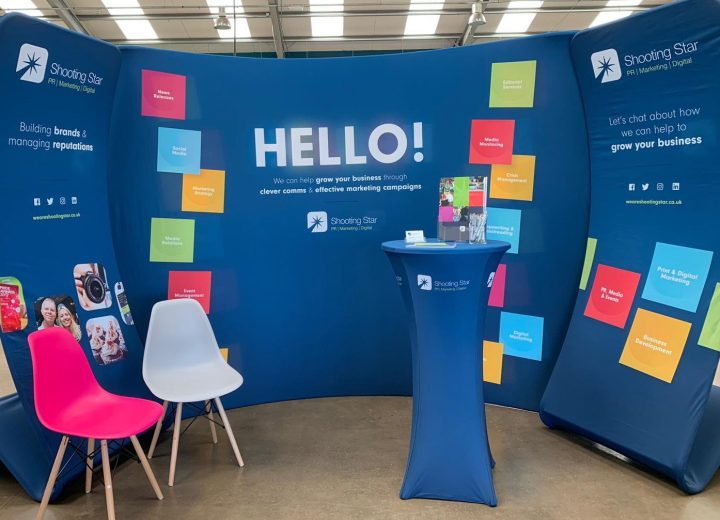Keeping Track of Your Event Goals
Events won’t be the only thing you’re spending money on this year, so they have to work for you. Spend your money well, consider what you want to achieve – such as building a network of contacts, increased brand awareness and obtaining a greater understanding of your market – and consider how you can do that in the best way for your business and your budget. If done well events can add huge value to your brand for minimal cost.
Here are some top tips to consider.
Do you need to buy a stand space?
Don’t commit just because you feel you ‘should’ be there. Often, it’s much more useful to attend networking lunches, seminars and keep an eye on the event’s social channels. They’re a low cost way of making personal connections with potential customers and supplier contacts.
Do your research
To ensure you’re getting the most out of your stand space, do some research in advance of booking and attending. Who is already going? Who is exhibiting? Any guest speakers or sponsors of interest?
Ensure you go armed with questions, names and job titles and some useful facts about the businesses or people you want to speak to. Have they won an award recently? Just launched a new product? All these things will not only help ease the nerves on the day but will provide interesting points for conversation starters when you meet these people.
Our Business Development Manager touched on some great examples of networking and business development in her last blog ‘Networking – it’s all about relationships’.
Prepare to plan and plan some more!
Events take a lot of preparation and organisation, so don’t get caught out and leave things until the last minute. Prepare and then plan some time in for things you’ll forget too (this will always happen!). Having a marketing or event plan in place, no matter how detailed, will ensure you keep on track and can organise for everything to happen in advance of the event – save any potential last-minute headaches!
We offer some advice on creating marketing plans in our blog and they might come in useful for when you start to think about the year ahead too!
Go big or go home!
This is not always true – you can always start small. If you feel you’re well placed to test the water at an event, you’ve done your research and know the audience, then secure yourself a small-ish space. For a long time now we’ve booked a standard (3m x 2m) stand space and made the most of our time at an event. How? By promoting the fact we’re there before during and after an event on social media using relevant event hashtags and tags.
Social Media – make it work for you
We touched on using social media to promote you in the lead-up to the event and afterwards, but there are also lots of other ways it can be useful. Follow up conversations you’ve had and people you’ve met, connect with them on LinkedIn and follow their business on Instagram or Facebook – but bear in mind not everyone needs or uses every channel!
Choose how the event will work for you…
How? By engaging in conversations with people on the day. Don’t wait for people to come to you, wander out (don’t leave your stand unattended though!) and meet people, introduce yourself to fellow exhibitors and delegates. Ask questions: what do they do, why are they here and what do they get out of events for their business? You don’t have to sell your business (directly) to everyone you talk to. It’s subtle, genuine conversations that will drive further reciprocal questions about your business and why you’re there. People buy from people – it’s a fact.
Pursue opportunities and new avenues
Sometimes you’re able to secure a stand space for free if you’re happy to present at an event, deliver a seminar or offer something of value to the event organisers. Don’t be afraid to ask; you know the old saying ‘if you don’t ask, you don’t get’. Event organisers are often looking for engaging expert speakers on specific subjects or areas of business, so the odds are if you’re attending their event, then you have a reason for that, some experience or skills of value. Don’t sell yourself short based on your business size – your knowledge is a valuable commodity!
On the day
One great thing to bear in mind on the day is that people generally (although there are some!) don’t tend to leave their personality and life experiences at the door of an exhibition hall or awards ceremony. They’re only human. They may be the CEO of the company you’ve been following / aiming to pitch to for a while now – but they’re also just like you. As I mentioned above, people sell to people and so remember that in your approaches!
I touched briefly above on following up leads and conversations. This is an important part of the initial relationship you’ve developed. Don’t go in for the hard sell but keep in touch and present opportunities as they arise. Very few new leads are converted overnight.
Post event ‘analysis’
You can crunch the numbers after an event: how many new followers did you get, how did your post perform and what level of engagement did you get? But it’s also a good idea to create some content for your website too – blog about your experience, or name check people or businesses you met who you feel could be useful to your customers.
If you’ve won an award or were shortlisted, then shout about it! We have some great tips on shouting about your success on our website.
Finally, it’s important to remember that events, awards and exhibitions aren’t for everyone. Sometimes they just don’t fit with your business. Don’t worry, the great thing about business it’s the test and learn approach – not everything will work well. Don’t be afraid to revisit things, tweak your plans and campaigns and remember that reviews and analysis will help you understand what works well for your business and what aspects of your marketing plan you’d use again.
SF










